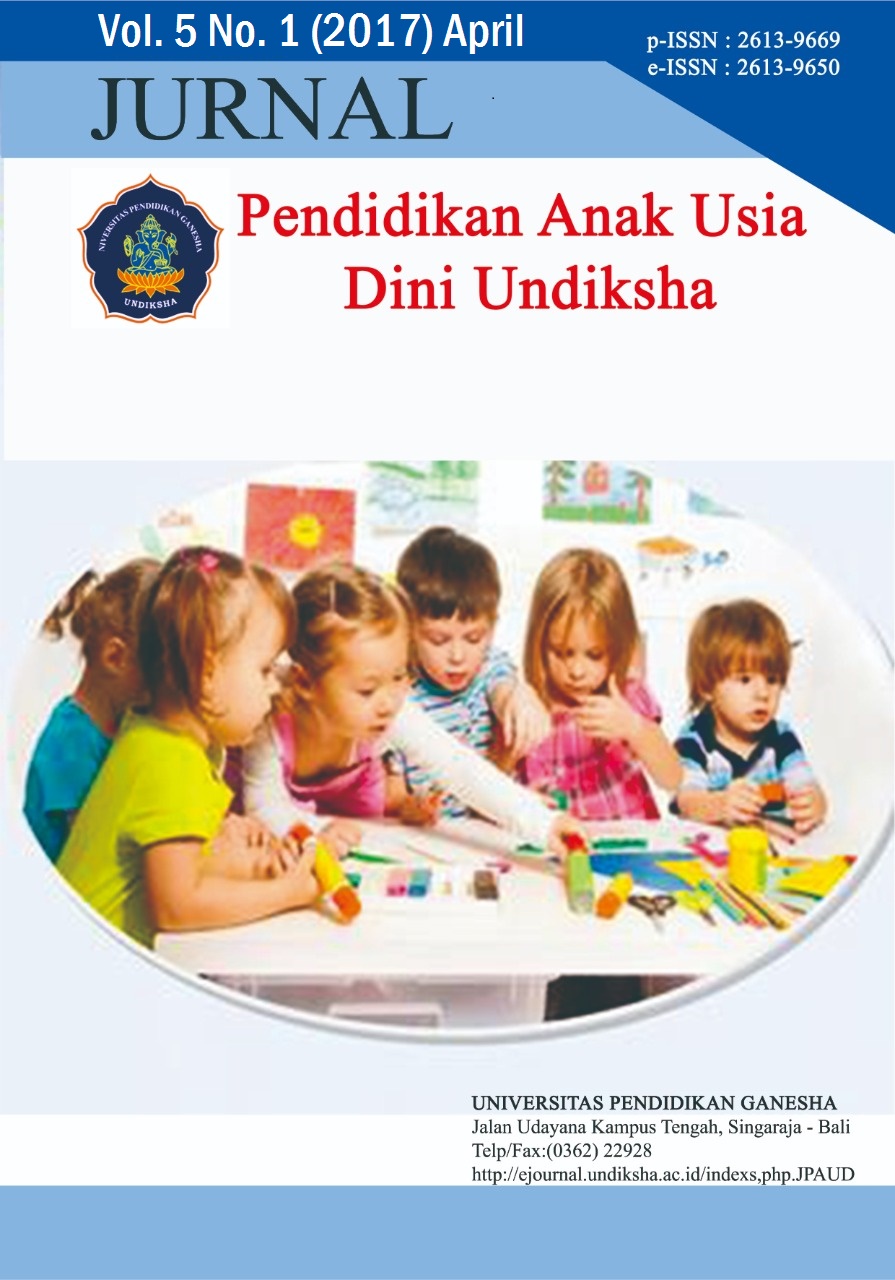PENGARUH PERMAINAN TRADISIONAL MEGOAK-GOAKAN TERHADAP PERKEMBANGAN KETERAMPILAN LOKOMOTOR ANAK KELOMPOK B DI TK GUGUS JEMPIRING KECAMATAN DENPASAR BARAT
DOI:
https://doi.org/10.23887/paud.v5i1.11213Abstract
Penelitian ini bertujuan untuk mengetahui perbedaan yang signifikan perkembangan keterampilan lokomotor antara kelompok anak yang dibelajarkan melalui permainan tradisional megoak-goakan dan kelompok anak yang dibelajarkan melalui pembelajaran konvensional. Jenis penelitian ini merupakan eksperimen semu (quasi experiment) dengan rancangan Nonequivalent Control Group Design. Populasi dalam penelitian ini adalah seluruh anak kelompok B TK Gugus Jempiring Denpasar Barat yang berjumlah 446 orang anak. Pengambilan sampel dilakukan dengan teknik random. Sampel penelitian ini adalah kelompok B4 PAUD Kusuma 2 Denpasar berjumlah 25 anak sebagai kelompok eksperimen dan TK Buana Kumara Asih Denpasar berjumlah 24 anak sebagai kelompok kontrol. Data hasil post-test dianalisis menggunakan analisis statistik deskriptif dan statistik inferensial dengan menggunakan uji-t. Berdasarkan hasil yang didapat thitung=3,01 dan ttabel= 2,00 (pada taraf signifikansi 5% dengan dk = 47). Oleh karena thitung 3,01> ttabel 2,00 maka terdapat perbedaan yang signifikan perkembangan keterampilan lokomotor antara kelompok anak yang dibelajarkan melalui permainan tradisional megoak-goakan dengan kelompok anak yang dibelajarkan melalui pembelajaran konvensional. Rata-rata perkembangan keterampilan lokomotor yang diperoleh antara kelompok eksperimen lebih tinggi dibandingkan kelompok kontrol (77,64>71,33). Maka dapat disimpulkan bahwa permainan tradisional megoak-goakan berpengaruh terhadap perkembangan keterampilan lokomotor pada anak kelompok B PAUD Gugus Jempiring Denpasar Tahun Pelajaran 2016/2017.Kata Kunci : permainan tradisonal megoak-goakan, perkembangan keterampilan lokomotor
This research aims to determine the significant differences in the development of locomotor skills between groups of children who were taught through traditional megoak-goakan games and groups of children learned through conventional learning. This type of research is a quasi experiment with Nonequivalent Control Group Design design. The population in this research is all children of group TK Gugus Jempiring West Denpasar, amounting to 446 children. Sampling was done by random technique. The sample of this research is B4 PAUD Kusuma 2 Denpasar group of 25 children as experimental group and TK Buana Kumara Asih Denpasar amounted to 24 children as control group. Post-test results were analyzed using descriptive statistics and inferential statistics using the t-test. Based on the results obtained thitung = 3.01 and ttabel = 2.00 (at 5% significance level with dk = 47). Therefore thitung 3.01> ttabel 2.00 then there is a significant difference in the development of locomotor skills between groups of children who are taught through traditional megoak games with groups of children who are taught through conventional learning. The average development of locomotor skills obtained between the experimental groups was higher than the control group (77.64> 71.33). So it can be concluded that the traditional game megoak-go affect on the development of locomotor skills in children group B PAUD Gugus Jempiring Denpasar Lesson 2016/2017.
keyword : tradisional game megoak-goakan, locomotor skills development
Downloads
Published
2017-07-25
How to Cite
Pramita Sari, N. M. A., Ganing, N. N., & .Tirtayani, L. A. (2017). PENGARUH PERMAINAN TRADISIONAL MEGOAK-GOAKAN TERHADAP PERKEMBANGAN KETERAMPILAN LOKOMOTOR ANAK KELOMPOK B DI TK GUGUS JEMPIRING KECAMATAN DENPASAR BARAT. Jurnal Pendidikan Anak Usia Dini Undiksha, 5(1), 55–64. https://doi.org/10.23887/paud.v5i1.11213
Issue
Section
Articles
License
Authors who publish with the Jurnal Pendidikan Anak Usia Dini Undiksha agree to the following terms:
- Authors retain copyright and grant the journal the right of first publication with the work simultaneously licensed under a Creative Commons Attribution License (CC BY-SA 4.0) that allows others to share the work with an acknowledgment of the work's authorship and initial publication in this journal.
- Authors are able to enter into separate, additional contractual arrangements for the non-exclusive distribution of the journal's published version of the work (e.g., post it to an institutional repository or publish it in a book), with an acknowledgment of its initial publication in this journal.
- Authors are permitted and encouraged to post their work online (e.g., in institutional repositories or on their website) prior to and during the submission process, as it can lead to productive exchanges, as well as earlier and greater citation of published work. (See The Effect of Open Access)











